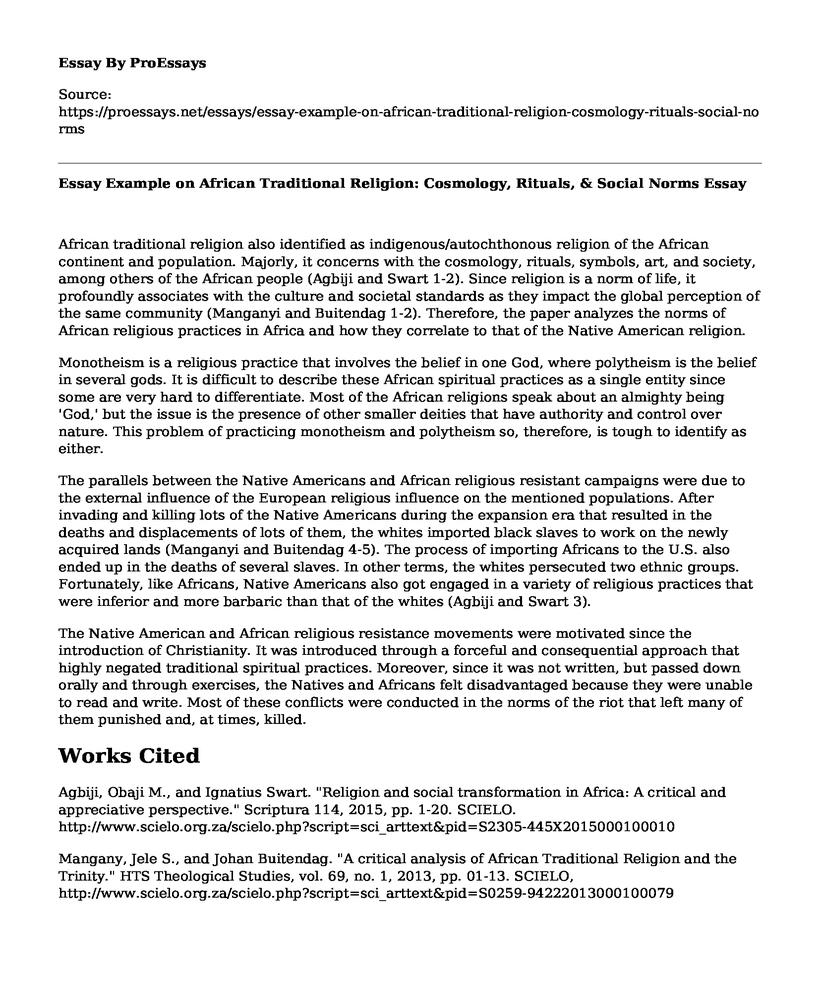African traditional religion also identified as indigenous/autochthonous religion of the African continent and population. Majorly, it concerns with the cosmology, rituals, symbols, art, and society, among others of the African people (Agbiji and Swart 1-2). Since religion is a norm of life, it profoundly associates with the culture and societal standards as they impact the global perception of the same community (Manganyi and Buitendag 1-2). Therefore, the paper analyzes the norms of African religious practices in Africa and how they correlate to that of the Native American religion.
Monotheism is a religious practice that involves the belief in one God, where polytheism is the belief in several gods. It is difficult to describe these African spiritual practices as a single entity since some are very hard to differentiate. Most of the African religions speak about an almighty being 'God,' but the issue is the presence of other smaller deities that have authority and control over nature. This problem of practicing monotheism and polytheism so, therefore, is tough to identify as either.
The parallels between the Native Americans and African religious resistant campaigns were due to the external influence of the European religious influence on the mentioned populations. After invading and killing lots of the Native Americans during the expansion era that resulted in the deaths and displacements of lots of them, the whites imported black slaves to work on the newly acquired lands (Manganyi and Buitendag 4-5). The process of importing Africans to the U.S. also ended up in the deaths of several slaves. In other terms, the whites persecuted two ethnic groups. Fortunately, like Africans, Native Americans also got engaged in a variety of religious practices that were inferior and more barbaric than that of the whites (Agbiji and Swart 3).
The Native American and African religious resistance movements were motivated since the introduction of Christianity. It was introduced through a forceful and consequential approach that highly negated traditional spiritual practices. Moreover, since it was not written, but passed down orally and through exercises, the Natives and Africans felt disadvantaged because they were unable to read and write. Most of these conflicts were conducted in the norms of the riot that left many of them punished and, at times, killed.
Works Cited
Agbiji, Obaji M., and Ignatius Swart. "Religion and social transformation in Africa: A critical and appreciative perspective." Scriptura 114, 2015, pp. 1-20. SCIELO. http://www.scielo.org.za/scielo.php?script=sci_arttext&pid=S2305-445X2015000100010
Mangany, Jele S., and Johan Buitendag. "A critical analysis of African Traditional Religion and the Trinity." HTS Theological Studies, vol. 69, no. 1, 2013, pp. 01-13. SCIELO, http://www.scielo.org.za/scielo.php?script=sci_arttext&pid=S0259-94222013000100079
Cite this page
Essay Example on African Traditional Religion: Cosmology, Rituals, & Social Norms. (2023, Mar 26). Retrieved from https://proessays.net/essays/essay-example-on-african-traditional-religion-cosmology-rituals-social-norms
If you are the original author of this essay and no longer wish to have it published on the ProEssays website, please click below to request its removal:
- Paper Example on Federal Preparedness and Mitigation Programs
- Mental Stress in a Family Has a Child With Autism or Other Diseases Essay
- The United States Counterintelligence - Essay Sample
- Canada's Democracy: Stable Traditions, Varied Opinions, Political Parties - Essay Sample
- Great Leap Forward: Transforming Chinese Agriculture and Industry - Essay Sample
- 1960s Unrest Repeats Itself: Protests, Wars, Turmoil Today - Essay Example
- Essay Example on Minorities in Information Technology







